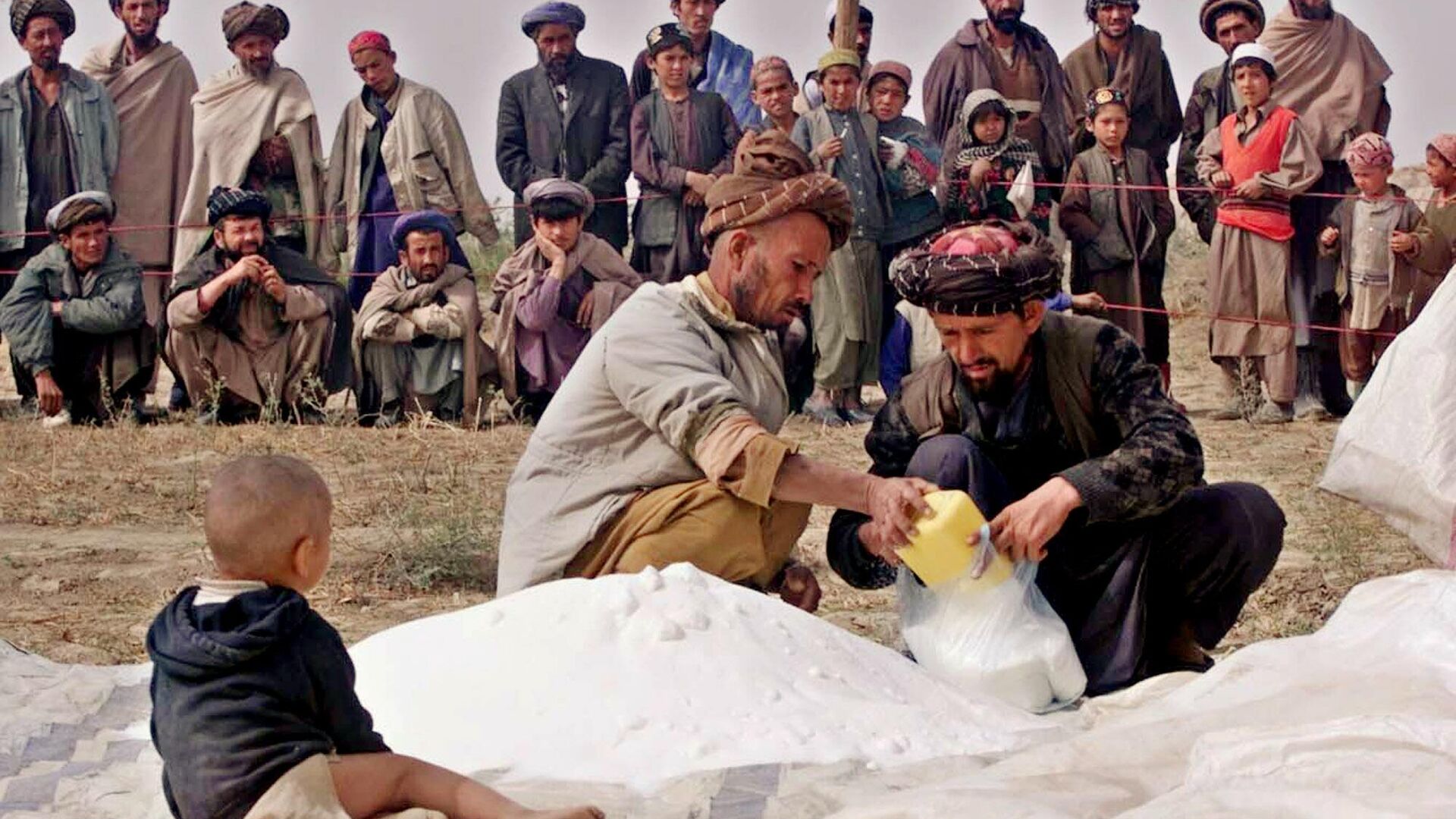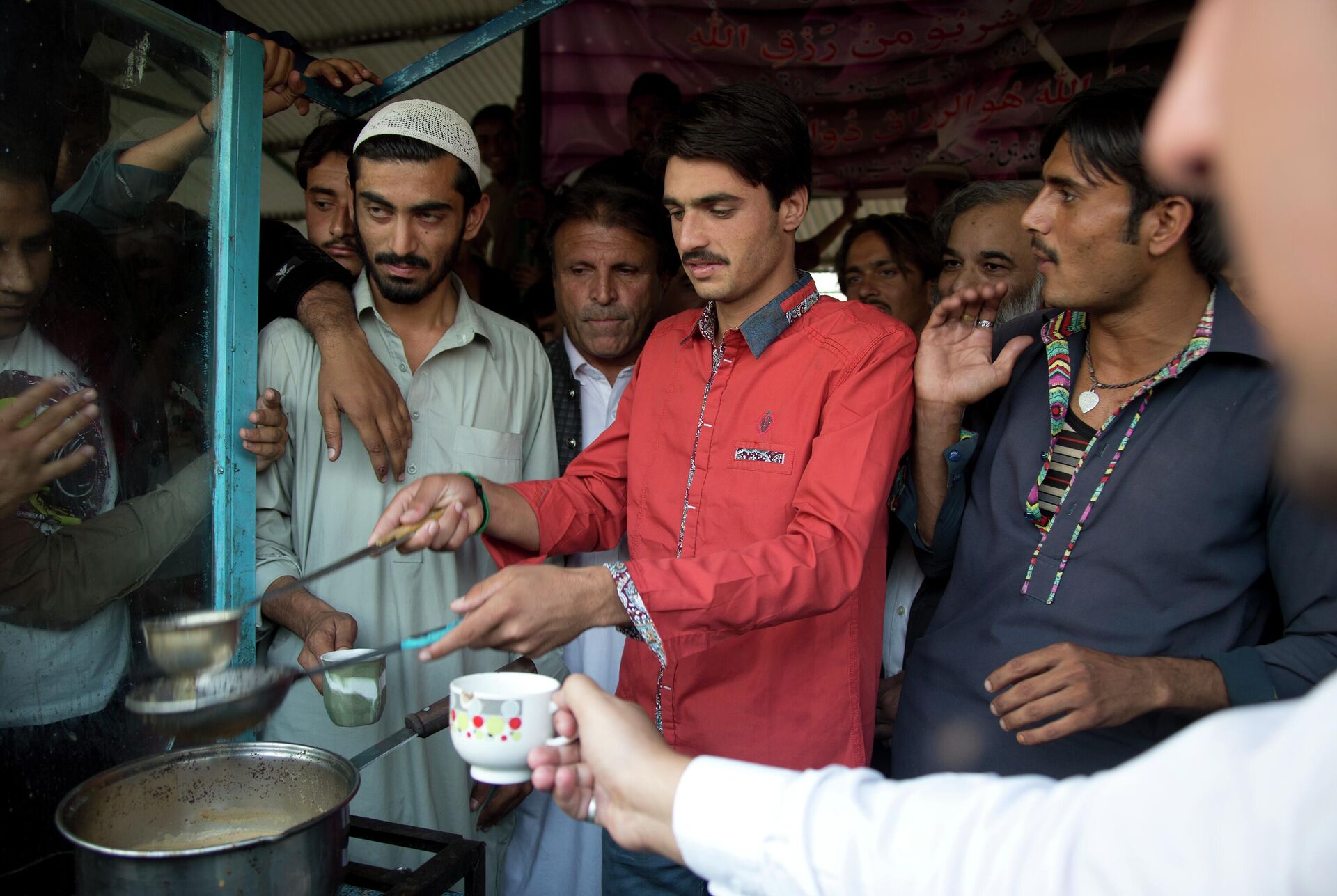https://sputniknews.in/20230914/impact-of-pakistans-sugar-crisis-rips-through-society-4249476.html
Impact of Pakistan's Sugar Crisis Rips Through Society
Impact of Pakistan's Sugar Crisis Rips Through Society
Sputnik India
Pakistan finds itself grappling with a sugar crisis that has sent shockwaves through the economy.
2023-09-14T21:58+0530
2023-09-14T21:58+0530
2023-09-14T22:05+0530
pakistan
south asia
economic crisis
food crisis
black market
agriculture
sputnik opinion
https://cdn1.img.sputniknews.in/img/07e7/05/04/1815083_0:141:2001:1266_1920x0_80_0_0_55e2c8bef5ad5362356b41a6f46346ad.jpg
The sugar crisis in Pakistan is not a novel phenomenon. It's a cyclical issue that often arises due to a confluence of factors, including fluctuations in production, hoarding by powerful sugar mill owners and government mismanagement. In 2023, however, these factors have coalesced to create a perfect storm, leaving Pakistanis struggling to satisfy their sweet tooth.Sputnik India takes a look at how it is affecting the social fabric of Pakistani society and what could be done to mitigate it.Social and Economic ImplicationsThe most immediate and tangible effect of the sugar crisis is the surge in sugar prices. Pakistanis are now paying significantly more for this essential ingredient, with the cost of sugar per kilogram reaching unprecedented heights. The cost of sugar surged to an astonishing Rs. 250 ($0.84) per kilogram across all major cities in the country earlier this month.This has put a strain on households' budgets, especially those with limited financial resources, as higher sugar prices lead to reduced purchasing power for the average Pakistani family.A staple ingredient in many traditional dishes and beverages, the increased cost of sugar forces people to cut back on their consumption of various items, affecting their overall quality of life. Hence, the sugar crisis isn't just about economics as it has profound social implications. The increased cost of sugar affects food security and for many in Pakistan sugar is part of the cultural fabric, as white tea with sugar is consumed by millions of people several times a day. It is a bonding experience and serves as a break from work for office-goers, house servants, and elderly people. Need for a Balancing ActApart from bad economics, the sugar crisis also has ramifications for the agricultural sector, a significant contributor to Pakistan's economy. Farmers who rely on sugarcane cultivation face uncertainty as the demand for their produce fluctuates due to market volatility.In a comment for Sputnik India, UK-based political observer and writer, Parvaiz Salik, shared how the sugar crisis is also negatively affecting foreign investors.He further explained that the government's inability to effectively address the sugar crisis undermines its credibility and leadership in managing the country's economic affairs.Promoting Fair CompetitionAccording to the political observer, such a crisis plays into the hands of groups who make illegal profit via smuggling.In response to how to mitigate such a crisis, the observer said that Pakistan requires a multi-faceted approach."The government must take measures to ensure transparency in the sugar industry and hold accountable those who engage in hoarding or price manipulation," he said.There is also a need for diversification, which means that the country's agriculture sector must reduce overreliance on sugarcane in order to help mitigate future crises.Furthermore, the government may consider targeted subsidies or relief packages to support low-income families who are seriously affected by the rising prices, as this would provide immediate relief to those struggling to make ends meet.Earlier this year, the government introduced several measures to clamp down on the smuggling of sugar, flour and other commodities for sale on the black market in Afghanistan. Such measures were aimed at alleviating the country's food insecurity and inflation need to continue.Overall, the recent sugar crisis in Pakistan is more than a matter of rising prices; it's a multifaceted issue with deep-reaching consequences for consumers and the economy. In order to alleviate it, a comprehensive and transparent strategy may help overcome this recurring challenge in the country.
https://sputniknews.in/20230816/why-might-pakistan-not-reap-maximum-benefit-from-cpec-in-near-future-3622947.html
pakistan
south asia
Sputnik India
feedback.hindi@sputniknews.com
+74956456601
MIA „Rossiya Segodnya“
2023
Aneela Rashid
https://cdn1.img.sputniknews.in/img/07e6/0c/0d/74548_0:0:485:484_100x100_80_0_0_821526e967ae85d041e2d30ee34fa1de.jpg
Aneela Rashid
https://cdn1.img.sputniknews.in/img/07e6/0c/0d/74548_0:0:485:484_100x100_80_0_0_821526e967ae85d041e2d30ee34fa1de.jpg
News
en_IN
Sputnik India
feedback.hindi@sputniknews.com
+74956456601
MIA „Rossiya Segodnya“
Sputnik India
feedback.hindi@sputniknews.com
+74956456601
MIA „Rossiya Segodnya“
Aneela Rashid
https://cdn1.img.sputniknews.in/img/07e6/0c/0d/74548_0:0:485:484_100x100_80_0_0_821526e967ae85d041e2d30ee34fa1de.jpg
impact of pakistan's sugar crisis rips through society, what are the problems with the sugar industry in pakistan, what is the sugar scandal report in pakistan, can we export sugar from pakistan, what is the sugar industry in pakistan
impact of pakistan's sugar crisis rips through society, what are the problems with the sugar industry in pakistan, what is the sugar scandal report in pakistan, can we export sugar from pakistan, what is the sugar industry in pakistan
Impact of Pakistan's Sugar Crisis Rips Through Society
21:58 14.09.2023 (Updated: 22:05 14.09.2023) Pakistan finds itself grappling with a sugar crisis that has sent shockwaves through the economy. This crisis has deep-rooted implications, from soaring prices on grocery shelves to a ripple effect on the nation's overall economic stability.
The
sugar crisis in Pakistan is not a novel phenomenon. It's a cyclical issue that often arises due to a confluence of factors, including
fluctuations in production, hoarding by powerful sugar mill owners and government mismanagement. In 2023, however, these factors have coalesced to create a perfect storm, leaving
Pakistanis struggling to satisfy their sweet tooth.
Sputnik India takes a look at how it is affecting the social fabric of Pakistani society and what could be done to mitigate it.
Social and Economic Implications
The most immediate and tangible effect of the sugar crisis is the surge in sugar prices. Pakistanis are now paying significantly more for this essential ingredient, with the cost of sugar per kilogram reaching unprecedented heights. The cost of sugar surged to an astonishing Rs. 250 ($0.84) per kilogram across all major cities in the country earlier this month.
This has put a strain on households' budgets, especially those with limited financial resources, as higher sugar prices lead to reduced purchasing power for the average Pakistani family.
A staple ingredient in many traditional dishes and beverages, the increased cost of sugar forces people to cut back on their consumption of various items, affecting their overall quality of life. Hence, the sugar crisis isn't just about economics as it has profound social implications.
The increased cost of sugar affects food security and for many in Pakistan sugar is part of the cultural fabric, as white tea with sugar is consumed by millions of people several times a day. It is a bonding experience and serves as a break from
work for office-goers, house servants, and elderly people.
Apart from bad economics, the sugar crisis also has ramifications for the agricultural sector, a significant contributor to Pakistan's economy. Farmers who rely on sugarcane cultivation face uncertainty as the demand for their produce fluctuates due to market volatility.
In a comment for Sputnik India, UK-based political observer and writer, Parvaiz Salik, shared how the sugar crisis is also negatively affecting foreign investors.
"The sugar crisis raises concerns among investors about Pakistan's economic stability. Instances of mismanagement and market manipulation deter foreign and domestic investments, which are crucial for economic growth," Salik said.
He further explained that the government's inability to effectively address the sugar crisis undermines its credibility and leadership in managing the
country's economic affairs.
"It faces a delicate balancing act between addressing consumers' concerns and managing political pressure from influential sugar mill owners," Salik added.
Promoting Fair Competition
According to the political observer, such a crisis plays into the hands of groups who make illegal profit via smuggling.
"Unfortunately this crisis plays into the hands of the mafia who will cash in. Furthermore, it destabilizes the political scenario as some political parties may see this as an excuse to delay elections, especially if the law and order situation deteriorates," Salik shared.
In response to how to mitigate such a crisis, the observer said that Pakistan requires a multi-faceted approach.
"The
government must take measures to ensure transparency in the sugar industry and hold accountable those who engage in hoarding or price manipulation," he said.
There is also a need for diversification, which means that the country's agriculture sector must reduce overreliance on sugarcane in order to help mitigate future crises.
"Then there is market regulation which is of utmost importance as by implementing effective market regulations, the government can prevent monopolistic practices and promote fair competition within the sugar industry," Salik said.
Furthermore, the government may consider targeted subsidies or relief packages to support low-income families who are seriously affected by the rising prices, as this would provide immediate relief to those struggling to make ends meet.
Earlier this year, the government introduced several measures to clamp down on the smuggling of sugar, flour and other commodities for sale on the black market in Afghanistan. Such measures were aimed at alleviating the country's food insecurity and inflation need to continue.
Overall, the recent sugar crisis in Pakistan is more than a matter of rising prices; it's a multifaceted issue with deep-reaching consequences for consumers and the economy. In order to alleviate it, a comprehensive and transparent strategy may help overcome this recurring challenge in the country.




